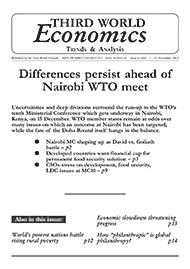Issue
No. 604 (1-15 November 2015)
Differences
persist ahead of Nairobi WTO meet

*Click on cover
to download (PDF)
Nairobi
MC shaping up as David vs. Goliath battle
At
the upcoming WTO Ministerial Conference in Nairobi, developing countries
face an uphill task of not only securing some credible development-friendly
outcomes but also defending the very continuation of the Doha Round
trade talks.
by
D. Ravi Kanth
Developed
countries want financial cap for permanent food security solution
Efforts
to produce meaningful outcomes in Nairobi on several key agricultural
issues – public food stocks, a special safeguard mechanism, export
competition and cotton trade – have met with resolute opposition led
by major developed countries. The following four articles look at
the state of play on these issues in the talks running up to the Ministerial
Conference.
by
D. Ravi Kanth
US
wants flexibilities on export credits, opposes SSM and food security
solution
by
D. Ravi Kanth
Cotton-4
shocked at US “no” to binding outcomes at Nairobi
by
D. Ravi Kanth
SSM
blocked by US, EU, Australia and Brazil
by
D. Ravi Kanth
CSOs
stress on development, food security, LDC issues at MC10
On
the eve of the Nairobi meet, civil society groups have called upon
WTO members to ensure that the conference meets development demands
and resists the imposition of “a corporate wish list of ‘new issues’”
on the post-Ministerial agenda.
by
Kanaga Raja
World’s
poorest nations battle rising rural poverty
Tackling
poverty in the least-developed countries calls for agricultural modernization
and diversification of the rural economy, a UN development agency
advocates.
by
Thalif Deen
Economic
slowdown threatening progress
With
the spectre of stagnation looming over the global economy, developing
countries need sufficient fiscal and policy space to safeguard macroeconomic
stability and promote sustainable development.
by
Jomo Kwame Sundaram
Analysis:
How “philanthropic” is global philanthropy?
The
increasingly active engagement of the philanthropic sector in international
development has brought with it a greater pool of resources but also
growing concern over the impact philanthropic foundations have on
development
agenda-setting and on global democratic governance.
by
Jens Martens and Karolin Seitz
